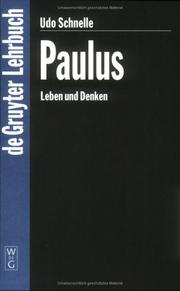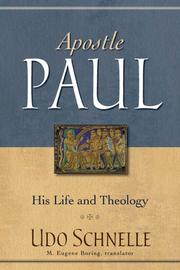| Listing 1 - 10 of 38 | << page >> |
Sort by
|
Book
ISBN: 9789042921993 9042921994 Year: 2009 Volume: 226 Publisher: Leuven Peeters
Abstract | Keywords | Export | Availability | Bookmark
 Loading...
Loading...Choose an application
- Reference Manager
- EndNote
- RefWorks (Direct export to RefWorks)
Bible NT. Epistles of Paul. Romans --- Bible --- Criticism, interpretation, etc --- 227.1*1 --- Academic collection --- Brief van Paulus aan de Romeinen --- Conferences - Meetings --- 227.1*1 Brief van Paulus aan de Romeinen --- Bible. --- Epître aux Romains (Book of the New Testament) --- List do Rzymian (Book of the New Testament) --- Roma-sŏ --- Római levél --- Romans (Book of the New Testament) --- Romasŏ --- Criticism, interpretation, etc. --- Bible. N.T. Romans --- Congresses
Book
ISBN: 9783374027569 3374027563 Year: 2010 Volume: 17 Publisher: Leipzig Evangelische Verlagsanstalt
Abstract | Keywords | Export | Availability | Bookmark
 Loading...
Loading...Choose an application
- Reference Manager
- EndNote
- RefWorks (Direct export to RefWorks)

ISBN: 311012856X 3110151642 3110893649 Year: 2003 Volume: *2 Publisher: Berlin Gruyter
Abstract | Keywords | Export | Availability | Bookmark
 Loading...
Loading...Choose an application
- Reference Manager
- EndNote
- RefWorks (Direct export to RefWorks)
Dieses Lehrbuch entfaltet das Denken des Paulus vor dem Hintergrund seines Lebens. Der erste Hauptteil behandelt das Leben und die Briefe, im zweiten Hauptteil folgt eine thematisch strukturierte Darstellung der zentralen Themen des paulinischen Denkens, das so gleichermaßen in seiner historischen Genese und in seiner Systemqualität erfaßt wird. In Aufnahme der neueren wissenssoziologischen und geschichtstheoretischen Diskussion wird die paulinische Theologie als eine Sinnbildung verstanden, die sich durch hohe Anschlußfähigkeit auszeichnet. Trotz zahlreicher denkerischer Probleme und widriger historischer Umstände gelingt es Paulus, sein durch einen messianischen Universalismus gekennzeichnetes Denken in die bereits bestehenden Sinnwelten der hellenistischen Kultur zu installieren. Dabei zeigt sich, wie stark Paulus auch in den Kategorien dieser Kultur dachte und wie er in der Lage war, in seinen Gemeinden eine neue kognitive und emotionale Identität zu schaffen. Seit geraumer Zeit ist dies wieder eine neue, umfassende Gesamtdarstellung von Person und Theologie des Apostels Paulus. This textbook reveals Paul's thought against the background of his life. The first main section deals with his life and his epistles, and the second main section then presents a thematically structured account of the main themes of Paul's thinking, so that equal weight is given both to its historical genesis and to its structurality. Recent research in the sociology of knowledge and historical theory sees Paul's theology as a symbolism distinguished by a high level of connectivity. Despite numerous philosophical problems and adverse historical conditions, Paul succeeds in placing his thinking, which is characterised by a messianic universalism, within the existing sense-worlds of Hellenistic culture. This shows how strongly St. Paul's thought was grounded in this culture, and how he was in a position to create a new cognitive and emotional identity in his congregations.
Paul [Apostle] --- 227*0 --- 227.08 --- Leven van Paulus --- Paulinische theologie --- 227.08 Paulinische theologie --- 227*0 Leven van Paulus --- Apostles -- Biography. --- Bible. -- Epistles of Paul -- Theology. --- Paul, -- the Apostle, Saint. --- Religion --- Philosophy & Religion --- Christianity
Book
ISBN: 3460043717 9783460043718 Year: 1989 Volume: 137 Publisher: Stuttgart Katholisches Bibelwerk
Abstract | Keywords | Export | Availability | Bookmark
 Loading...
Loading...Choose an application
- Reference Manager
- EndNote
- RefWorks (Direct export to RefWorks)
227.08 --- #GGSB: Exegese N.T. --- #GGSB: Paulus --- #GGSB: Tekstkritiek N.T. --- #GROL:SEMI-22<08> Stut 137 --- Paulinische theologie --- 227.08 Paulinische theologie --- #GGSB: Exegese N.T --- #GGSB: Tekstkritiek N.T --- Bible. --- Epistles of Paul --- Paul, Epistles of --- Paul Sŏsin --- Pauline epistles --- Risālat al-Qiddīs Būlus al-rasūl al-thāniyah ilá Tīmūthīʼūs --- Theology. --- Exegese N.T --- Paulus --- Tekstkritiek N.T
Book
ISBN: 3374016731 9783374016730 Year: 1998 Volume: 4 Publisher: Leipzig Evangelische Verlagsanstalt
Abstract | Keywords | Export | Availability | Bookmark
 Loading...
Loading...Choose an application
- Reference Manager
- EndNote
- RefWorks (Direct export to RefWorks)
226.5 --- Evangelie volgens Johannes --- Bible NT. Gospels. John --- Bible --- Bible. --- Jean (Book of the New Testament) --- Johanisi (Book of the New Testament) --- Johannesevangelium --- John (Book of the New Testament) --- Yohan pogŭm --- Yohane den (Book of the New Testament) --- Yūḥannā (Book of the New Testament) --- Commentaries. --- Ioganaĭ (Book of the New Testament) --- Иоганай (Book of the New Testament)
Book
ISBN: 9783525032862 3525032862 Year: 1994 Publisher: Göttingen: Vandenhoeck und Ruprecht,
Abstract | Keywords | Export | Availability | Bookmark
 Loading...
Loading...Choose an application
- Reference Manager
- EndNote
- RefWorks (Direct export to RefWorks)
Book
ISBN: 9780800625924 0800625927 Year: 1992 Publisher: Minneapolis: Fortress Press,
Abstract | Keywords | Export | Availability | Bookmark
 Loading...
Loading...Choose an application
- Reference Manager
- EndNote
- RefWorks (Direct export to RefWorks)

ISBN: 9780801027963 0801027969 Year: 2005 Publisher: Grand Rapids: Baker Academic,
Abstract | Keywords | Export | Availability | Bookmark
 Loading...
Loading...Choose an application
- Reference Manager
- EndNote
- RefWorks (Direct export to RefWorks)
Book
Year: 1991 Publisher: Neukirchen-Vluyn Neukirchener Verlag
Abstract | Keywords | Export | Availability | Bookmark
 Loading...
Loading...Choose an application
- Reference Manager
- EndNote
- RefWorks (Direct export to RefWorks)
Book
Year: 1989 Publisher: Stuttgart Katholisches Bibelwerk
Abstract | Keywords | Export | Availability | Bookmark
 Loading...
Loading...Choose an application
- Reference Manager
- EndNote
- RefWorks (Direct export to RefWorks)
| Listing 1 - 10 of 38 | << page >> |
Sort by
|

 Search
Search Feedback
Feedback About UniCat
About UniCat  Help
Help News
News